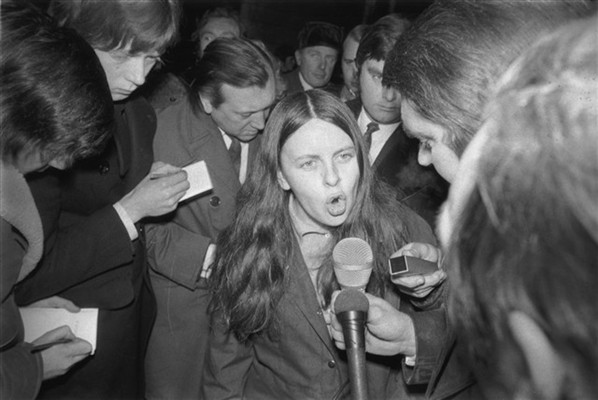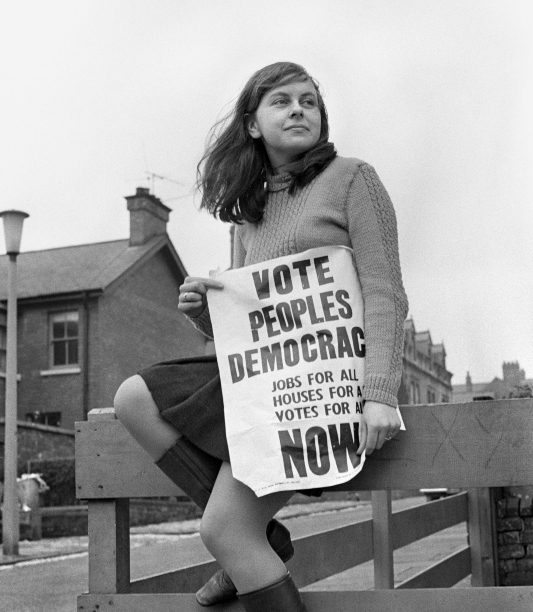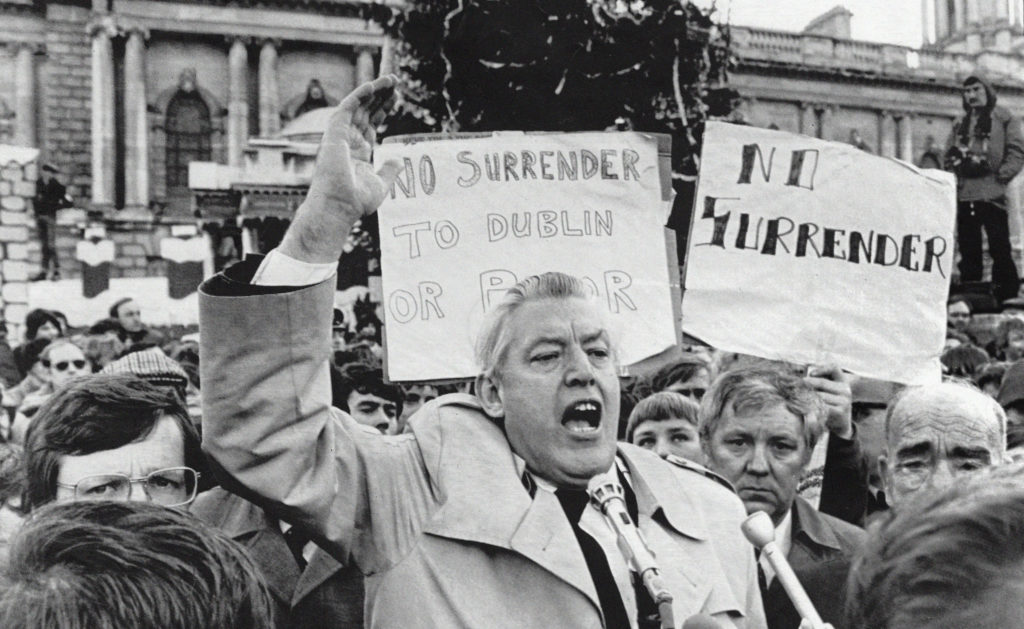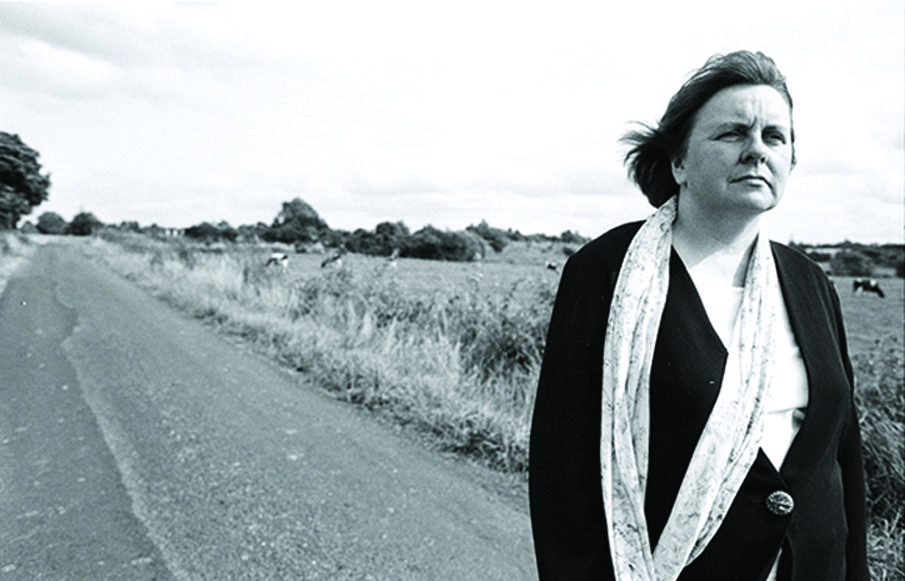After 800 years of colonial rule, Ireland finally got conditional freedom and fell victim to the British Empire’s deadliest legacy, partition. In the six northern counties, bigotry and resentment simmered over the years until it broke wide open in 1968. Then along came Bernadette.
In the beginning, there was a single face that symbolized the conflict, a passionate college student, Bernadette Devlin. She was a chain-smoking, plain-speaking waif who became known as, “Ireland’s Joan of Arc.”
The economic inequality over the years had left Bernadette’s family in poverty and on welfare, an experience she described as the “depths of degradation.” Her father, an Irish patriot, inspired his daughter with his dreams of a united Ireland. But, like most Catholics, he couldn’t find employment in the North and was forced to go to England for work, leaving his wife to bring up seven children alone. In school, Bernadette found a mentor in Mother Benignus, a fiery nun who taught her gifted student Irish history and language courses and impressed on her a national identity. Mother Benignus spat out her credo, “This government is English-based and therefore…The Enemy.” The nun delivered a revolutionary into the world.
Bernadette became one of the first generations of Catholics to attend Queen’s University in Belfast, arriving there in 1965, a time when students around the globe believed they could change the world. By the time she was a sophomore, both her parents were dead, requiring her to undergo a commute to and from University to care for her orphaned siblings. At the same time, she helped set up the Civil Rights Association in Northern Ireland, recruiting both Catholic and sympathetic Protestant members. Their model was based on the Black civil rights movement in the U.S. and “We Shall Overcome” was the group’s anthem.
In October 1968, she organized the first civil rights march in Northern Ireland, inspiring her followers to be as unafraid as she was, and its numbers swelled as the march continued. But the RUC (Royal Ulster Constabulary) began battering peaceful protestors with their batons, “I can still see the absolute hatred on the faces of police officers.” This was, Bernadette would later say, “my baptism.” A revolutionary was born. “I was then committed to the end of the road, wherever that was going.” She and other Queen’s students formed the People’s Democracy, a more radical movement.
In January 1969, she led a People’s Democracy march from Belfast to Derry which was ambushed and attacked by Loyalists under the direction of Evangelical clergyman Rev. Ian Paisley, ever on the lookout for the stalking pope. The RUC looked blithely in the other direction until they joined the attack.
After this march, she was now a high-profile figure emboldened to take her voice to Parliament and she won a seat in the British House of Commons. Bernadette was 21, the youngest woman in history ever elected to Parliament. She brought her righteous indignation to that body with her maiden speech “There is no place in society for us, the ordinary ‘peasants’ of Northern Ireland . . . because we are the have-nots, and they are the haves.”
July and August are the months for marching in Ulster, and August brought the Battle of the Bogside. The Northern Ireland government had banned marches by civil rights groups but allowed Loyalist marches, deeming them to be traditional and apolitical. On August 12, 1969, 15,000 Protestant Apprentice Boys held their annual march, with the stated goal to “show the Catholics who was boss.” They marched through the Catholic section of Derry, throwing pennies at the residents, a snide reference to their poverty. A counter-demonstration sprung up and threw rocks at the Apprentice Boys.
The clash spread to Belfast, where the RUC and the dreaded B-Specials were ready, armed with machine guns and tear gas. Loudly shouting into a megaphone, Bernadette ordered her followers to defend themselves with petrol bombs, adding, “Throw them hard and straight.” She received a six-month prison sentence. The Battle lasted almost three days, and when it was over, eight people were killed and 1,000 injured. This incident prompted British PM Harold Wilson to deploy British soldiers to Northern Ireland. At first, this brought relief to Catholics who had lost faith in the RUC and believed the army would protect them. They were wrong.
On August 14, 1969, the army’s elite Parachute Regiment (“the Paras”) came to Ireland for a brief “emergency.” They stayed there for the next 38 years.
The same month, Bernadette went on an ill-fated tour of America. At first, she was embraced by Irish Americans as a celebrity; here was the brave freedom fighter from “the old country,” the Brit-Basher who raged into a megaphone. But at the time she visited, the U.S. was as divided by the Vietnam War as Northern Ireland was bitterly sectarian. Quickly, her American audience became disillusioned after learning she was a socialist. She was now “Fidel Castro in a mini skirt.”
She, in turn, was critical of Irish Americans for their lack of empathy toward the black civil rights movement. Couldn’t they see they were counterparts? When she was awarded the key to the city of New York, she sent it up to Harlem, as a gift for the Black Panthers. Bernadette would say the Irish Americans looked like Loyalists while she saw herself in Black faces. A fan of hers would have agreed: when Muhammad Ali visited Ireland, he said his sole ambition was “to meet Miss Bernadette Devlin.”
Somehow during the tumultuous year of 1969, she found time to write her autobiography, The Price of My Soul, a classic document of the early “Troubles” era. “I have written this book in an attempt to explain how the complexity of Northern Ireland threw up the phenomenon of Bernadette Devlin.” She was now 22 years old.
Devlin was re-elected to the House of Commons in 1970, this time running as an Independent Socialist, but a week after taking office, she was shipped off to serve her prison sentence. Later, she was joined in Parliament by her adversary, Rev. Ian Paisley, and both watched as Ulster deteriorated. The radical Ulster Volunteer Force (UVF) and the newly formed Provisional IRA were responsible for the deaths of soldiers and civilians. Desperate, Britain introduced internment – the arrest, interrogation, and torture of Republican suspects without trial. (Not surprisingly, in the sweep to capture prisoners, no UVF suspects were interned.) In 1971, heavily pregnant, Bernadette took to the streets to protest, but it was hopeless – internment continued and only increased the violence – 1972 was the deadliest year of the Troubles. Her fury was unabated even after the birth of her daughter Róisín in August 1971.
On January 30, 1972, a day that became known as Bloody Sunday, the Civil Rights Association organized a peaceful march to protest internment. Fifteen thousand unarmed men, women, and children gathered in Derry, surrounded by British Paratroopers, the RUC, and armored cars. Bernadette Devlin was the key speaker. A minor scuffle between teenage boys and soldiers began, and without provocation, the army fired on the crowd. By the end of the day, 14 defenseless civil rights marchers were dead. The global press covered the massacre, and now, the whole world was watching.
Two days later, Bernadette was in the House of Commons but denied the right to speak. However, Home Secretary Reginald Maudling did speak, and he spoke lies claiming the Paratroopers fired in self-defense. Securing her role as firebrand forever, she screamed across the House, “Murderous hypocrite!” and hurled herself at him and punched him twice in the face. It may have been her finest moment. She later wrote, “The penalty for demanding equal rights was that your government would kill you.”
Bloody Sunday was the pivot, where non-violence faded away, and membership in the Provisional IRA surged. Britain quickly assembled an inquiry, a whitewashed account of the day that only compounded the anger. In 2010, a comprehensive investigation, the Saville Report, found the army responsible, and British PM David Cameron offered an apology. But in the half-century that followed Bloody Sunday, no soldiers have been prosecuted, and the victims’ families are still demanding justice.

In 1973 she married Róisín’s father, schoolteacher Michael McAliskey, and they went on to have two more children. She failed to hold her seat in the 1974 general election and couldn’t find a comfortable niche in Sinn Féin, instead becoming a founding member of the Irish Republican Socialist Party. Devlin and her family moved to the remote countryside.
Living in seclusion turned out to be a mistake despite the British security force guarding their home. On January 16, 1981, Ulster Freedom Fighters (UFF), seeking revenge for her support of the H-Block prisoner campaign, took a sledgehammer to their front door. They shot Bernadette 14 times as she rushed to protect her children, and Michael was shot twice and left permanently disabled. The shooters left through the back door and were arrested when the Paratroopers (finally) showed up. A soldier spoke into the blood-soaked room, “Is anyone still alive in there?” She responded, but when they asked her name, Bernadette, half-dying, was filled with rage: “They were there to make sure that the gunmen got into my house and that they were caught on the way out.” And still, they had the effrontery to ask her name.
Her injuries were life-threatening, but the following year, unbowed, Bernadette Devlin McAliskey ran for a seat in the Irish Republic’s Dáil against disgraced Irish PM Charles Haughey. Her platform included a call for the withdrawal of British troops and a call for the withdrawal of Margaret Thatcher. She lost.
In later years, she continued her activism, with a granny cardigan now replacing the mini skirt. She leads community outreach programs to help the marginalized, migrants, and Travelers, giving frequent speeches and interviews and appearing on podcasts.
When, in 2007, British troops, “the peacekeepers,” were withdrawn, 3,800 people were dead from 30 years of fighting. Tragedy had scarred the lives of an entire generation, Catholic and Protestant.
The Good Friday Agreement in 1998 finally put an end to the bloodshed, although Bernadette, ever a revolutionary and contrarian, opposed the Agreement as a sell-out. It denied her dream of a United Ireland and ran counter to her Socialist sensibility; she believed it favored the middle class over the working class. She was one veteran of the Troubles who couldn’t or wouldn’t give up the fight – compromise, and expediency were never an option for her.
Postscripts: A more unexpected postscript to Northern Ireland and the Troubles came in 2021. When the census was released, it seems Catholics now outnumber Protestants, 45.7% to 43.5%. Even more surprising in this land where folks took their affiliation very seriously, 17.4% of Northern Ireland identify as “No religion.” Sinn Féin is now Northern Ireland’s largest party, and the largest party in the Dáil says it will boost its calls for a referendum on Irish unity.




Bernadette Devlin McAliskey is a very remarkable woman and person… and an Irish Patriot. I don’t know her views as of 2023, but she was very naive in her far left socialist political views of the 70s, her support of the Black Panthers, and her zero grasp of the intellectual level of the majority of negroes. //The main thing she always had correct was that the root problems in the North are socioeconomic domination by a minority group, the Ulster Scots, over the Irish. England has used the Ulster Scots as pawns forever. Now England has no use for them. // A 32 County Ireland is in sight but I suspect it will take significant bloodshed to achieve. And that the majority of Ulster Scots will have to leave Ireland. I don’t feature them being welcomed anywhere.
You call her naive for having socialist ideals? For having respect for the Black Panthers? And you then make an obvious derogatory slur re: the intellect of American “negros”?? In 2023? Give me a break. Crawl back under your rock.
My exact thoughts as well. Thank you.
I recall hearing Bernadette Devlin speak at Poe Park in the Bronx in 1970. Two things stand out in my memory all these years later. She said that there were very many Catholics and very many Protestant in Northern Ireland, but very little Christianity. She also exhorted the Irish Americans to treat American Blacks better than the Protestants were treating Catholics in Northern Ireland. She was nearly booed off the stage. She was right then, and is right now.